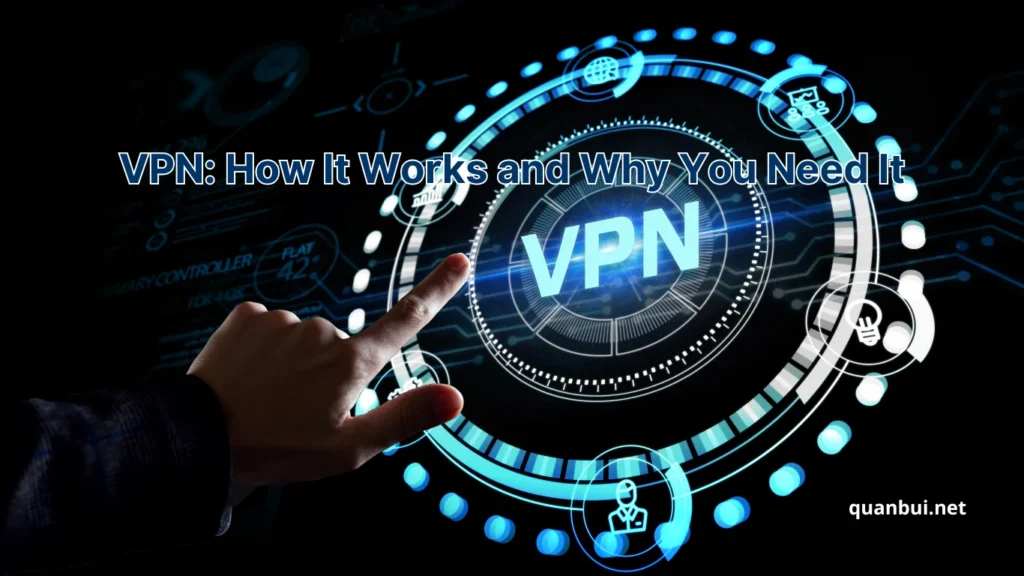How and why?
VPN: How It Works and Why You Need It
In an age where digital information flows seamlessly across the globe, maintaining online privacy and security has never been more critical. Imagine surfing the internet without a shield, where every click and keystroke is potentially exposed to prying eyes. Sounds unsettling, right? This is where a Virtual Private Network (VPN) steps in as your digital guardian, ensuring that your online activities remain private and secure.
Introduction
As the digital landscape evolves, so do the threats to our online privacy and security. From hackers targeting personal data to governments monitoring internet usage, the need for robust protection mechanisms has surged. Enter VPNs, powerful tools designed to shield your online presence from unauthorized access and surveillance. Whether you’re a casual internet user or a professional navigating sensitive information, understanding how VPNs work and why they are essential can significantly enhance your online experience.
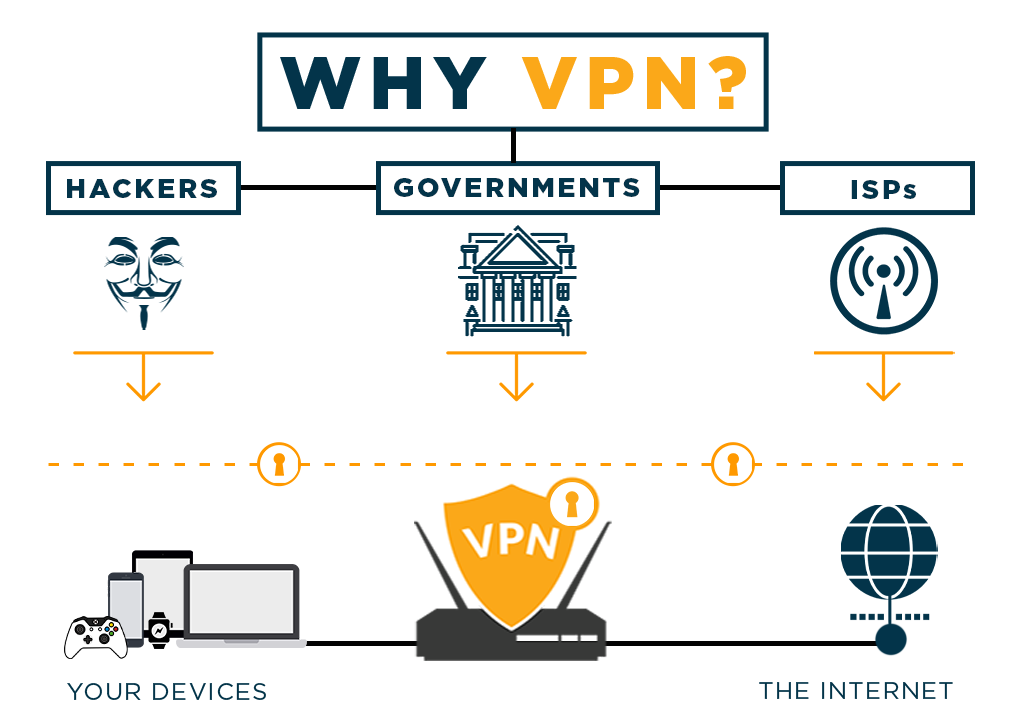
What Is a VPN?
A Virtual Private Network (VPN) is a service that creates a secure and encrypted connection between your device and the internet. Think of it as a tunnel that shields your online activities from external threats. Here’s a deeper dive into what makes VPNs indispensable:
- Encryption: VPNs use advanced encryption protocols to scramble your data, making it unreadable to anyone who intercepts it.
- IP Masking: By routing your internet traffic through a VPN server, your original IP address is hidden, providing anonymity.
- Secure Access: VPNs allow secure access to remote networks, making them invaluable for businesses with remote employees.
| Feature | Description |
|---|---|
| Encryption | Uses protocols like AES-256 to secure data transmission |
| Anonymity | Masks your IP address, enhancing privacy |
| Access | Enables secure access to restricted networks and geo-blocked content |
| Protocols | Includes OpenVPN, WireGuard, and IKEv2, each offering different benefits |
Why VPNs Are Becoming More Popular
The surge in VPN popularity can be attributed to several factors that resonate with today’s internet users. Here’s why more people are turning to VPNs:
- Increased Awareness of Privacy Risks: With high-profile data breaches and surveillance revelations, users are more conscious about their online footprints.
- Remote Work Boom: The shift to remote work has heightened the need for secure connections to access company resources safely.
- Geo-Restrictions and Content Access: Users seek to bypass regional restrictions on streaming platforms, accessing a wider array of content globally.
- Cybersecurity Threats: The rise in cyber threats like phishing, malware, and ransomware has made secure browsing a necessity.
| Reason | Impact |
|---|---|
| Privacy Awareness | Drives demand for tools that protect personal data and online activities |
| Remote Work | Necessitates secure connections for accessing corporate networks |
| Content Accessibility | Enables access to geo-blocked streaming services and websites |
| Cyber Threats | Provides a shield against various online security threats |
How VPNs Enhance Online Security
VPNs are pivotal in fortifying your online security in multiple ways:
- Data Encryption: Ensures that all data transmitted between your device and the internet is encrypted, safeguarding it from interception.
- IP Address Concealment: Hides your real IP address, making it difficult for malicious actors to track your online activities.
- Secure Public Wi-Fi Usage: Protects your data when connected to public Wi-Fi networks, preventing unauthorized access.
- Preventing Bandwidth Throttling: Masks your internet traffic, preventing ISPs from intentionally slowing down your connection based on usage.
- Advanced Encryption Standards: VPNs employ high-level encryption standards like AES-256, which is virtually unbreakable by current computational capabilities.
- No-Logs Policies: Reputable VPN providers adhere to strict no-logs policies, ensuring that your online activities are not recorded or stored.
- Built-In Security Features: Features like kill switches and DNS leak protection add extra layers of security, ensuring that your data remains protected even if the VPN connection drops.
| Security Feature | Description |
|---|---|
| AES-256 Encryption | High-level encryption standard for secure data transmission |
| No-Logs Policy | Ensures user activities are not tracked or stored |
| Kill Switch | Automatically disconnects internet if VPN fails, preventing data leaks |
| DNS Leak Protection | Ensures DNS queries are routed through the VPN, maintaining privacy |
How a VPN Works
Understanding the mechanics of a VPN helps in appreciating its value. At its core, a VPN creates a secure connection between your device and a VPN server, acting as an intermediary for your online activities.
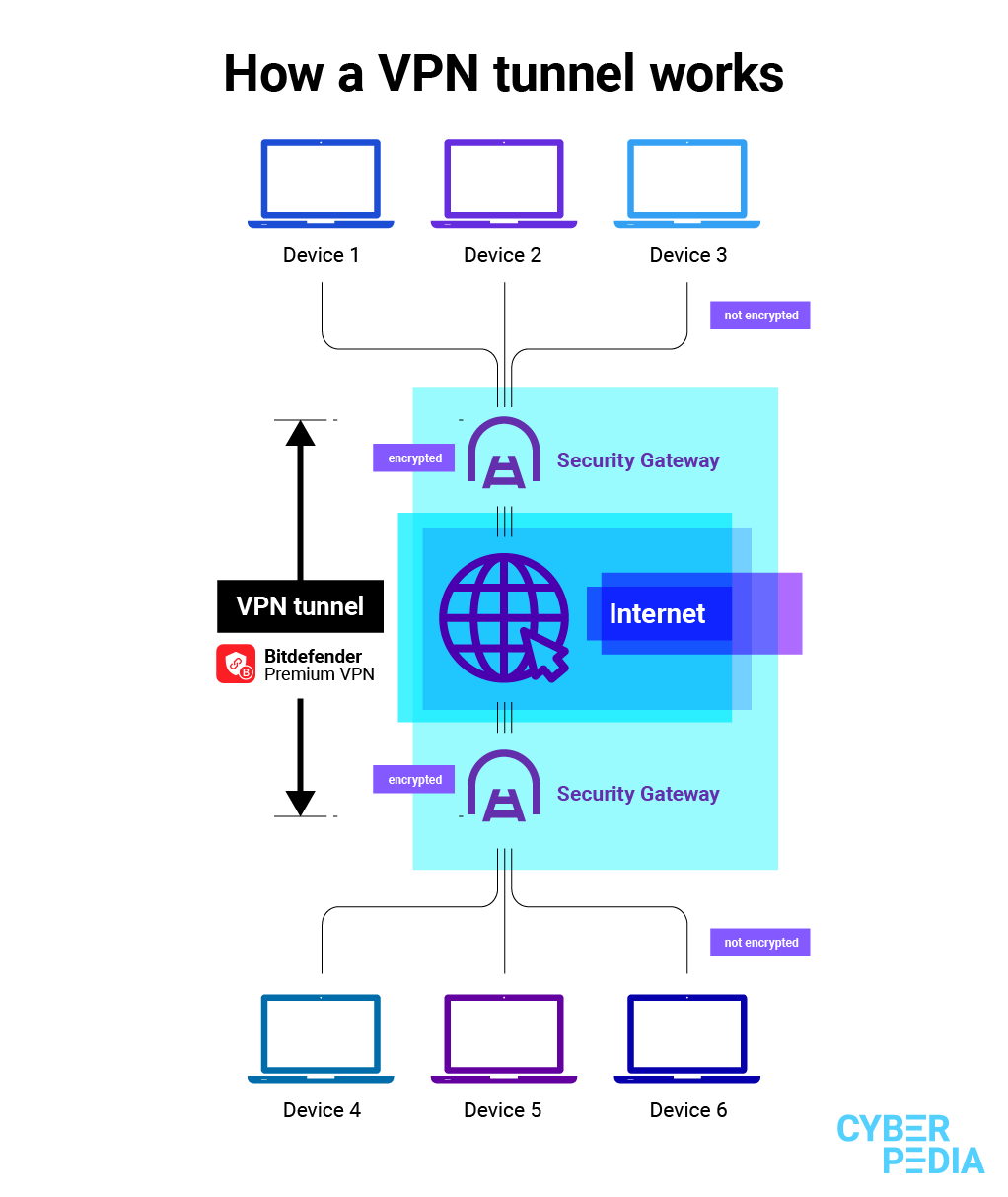
How a VPN Encrypts Your Internet Traffic
Encryption is the cornerstone of a VPN’s security capabilities. Here’s how it works:
- Data Scrambling: VPNs use encryption algorithms to convert your data into a coded format that is unreadable without the correct decryption key.
- Secure Protocols: Protocols like OpenVPN, WireGuard, and IKEv2 determine how data is encrypted and transmitted.
- End-to-End Security: Ensures that data remains encrypted from your device until it reaches the VPN server, safeguarding it at every point.
- Encryption Protocols:
- OpenVPN: Widely regarded for its balance of speed and security.
- WireGuard: Known for its lightweight and efficient encryption processes, offering faster connections.
- IKEv2: Ideal for mobile devices due to its stability and ability to reconnect seamlessly.
- Layered Security: Multiple layers of encryption protect your data from various types of cyber threats, providing comprehensive security coverage.
| Protocol | Speed | Security | Best For |
|---|---|---|---|
| OpenVPN | Moderate | High | General use, robust security |
| WireGuard | High | High | Fast connections, modern encryption |
| IKEv2 | High | Moderate | Mobile devices, stable connections |
How VPN Servers Hide Your IP Address
One of the primary functions of a VPN is to mask your original IP address. Here’s a detailed look:
- IP Substitution: When you connect to a VPN server, your real IP address is replaced with one from the server’s location, making your online actions appear to originate from the server.
- Anonymity: This substitution enhances your anonymity, making it difficult for websites, advertisers, and malicious entities to track your real location and identity.
- Bypassing Restrictions: By changing your IP address, VPNs enable access to content and services that may be restricted based on geographical location.
- Geolocation Masking: By assigning an IP address from a different region, VPNs allow users to appear as if they are browsing from that location.
- Enhanced Privacy: Concealing your IP address protects your identity, reducing the risk of targeted attacks and tracking.
| Feature | Impact |
|---|---|
| IP Substitution | Replaces your real IP with a server IP, enhancing anonymity |
| Geolocation Masking | Allows access to region-restricted content by appearing from a different location |
| Privacy Enhancement | Makes it difficult for third parties to track your online activities |
How VPN Tunneling Protects Your Data
VPN tunneling is a critical feature that ensures your data remains secure as it travels across the internet. Here’s how it works:
- Secure Tunnel Creation: VPNs establish a tunnel between your device and the VPN server, ensuring that data packets travel through this encrypted pathway.
- Data Integrity: The tunneling process maintains the integrity of your data, preventing tampering or alteration during transmission.
- Access Control: Only authorized users can access the data passing through the tunnel, thanks to robust authentication mechanisms.
- Types of Tunnels:
- Point-to-Point Tunnels: Direct connection between two points, ideal for secure communication.
- Secure Multi-Point Tunnels: Connect multiple devices through a single secure pathway, enhancing scalability.
- Layered Encryption: Multiple layers of encryption within the tunnel provide enhanced protection against sophisticated cyber threats.
| Tunnel Type | Description | Use Case |
|---|---|---|
| Point-to-Point | Direct, secure link between two endpoints | Secure communication between two servers |
| Multi-Point | Single tunnel connecting multiple devices | Organizations with remote employees |
Why You Should Use a VPN
Harnessing the power of a VPN can transform your online experience, providing a multitude of benefits that go beyond basic privacy protection.
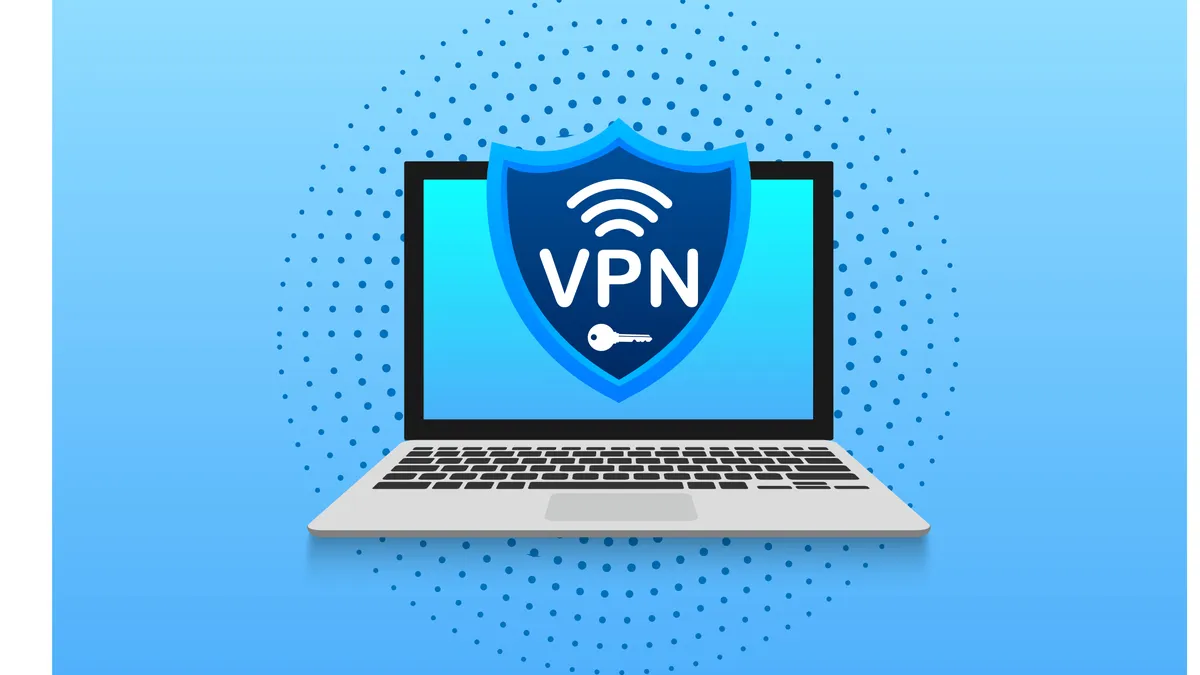
Why VPNs Are Essential for Online Privacy
In the digital age, preserving online privacy is paramount. Here’s why VPNs are indispensable in achieving this goal:
- Data Protection: VPNs encrypt your data, ensuring that sensitive information like passwords, financial details, and personal communications remain secure.
- Avoiding Tracking: By masking your IP address, VPNs prevent advertisers and websites from tracking your online behavior and building detailed profiles of your activities.
- Preventing Surveillance: Whether it’s governmental surveillance or unauthorized monitoring, VPNs act as a barrier, protecting your online interactions from being scrutinized.
- Comprehensive Privacy Shield: VPNs offer a multi-layered approach to privacy, combining encryption, IP masking, and secure protocols to create a robust defense against data breaches.
- Enhanced Anonymity: Users can browse the internet anonymously, reducing the risk of identity theft and other cybercrimes aimed at stealing personal information.
| Privacy Feature | Description |
|---|---|
| Data Encryption | Protects sensitive information from unauthorized access |
| IP Masking | Hides your real IP address, enhancing anonymity |
| Secure Protocols | Uses encryption protocols to safeguard online activities |
Why VPNs Help Bypass Geo-Restrictions
Accessing content restricted by geographical boundaries is a common desire among internet users. Here’s how VPNs facilitate this:
- Changing Virtual Location: By connecting to servers in different countries, VPNs allow users to appear as if they are browsing from those locations, thereby accessing region-locked content.
- Streaming Freedom: This capability is particularly beneficial for streaming services like Netflix, Hulu, and BBC iPlayer, which often have content libraries varying by region.
- Avoiding Censorship: In regions with strict internet censorship, VPNs enable users to access banned websites and services, promoting freedom of information.
- Content Libraries: Different regions offer unique content libraries; VPNs help unlock these exclusive offerings, providing a richer and more diverse online experience.
- Seamless Browsing: By switching server locations, users can enjoy uninterrupted access to their favorite platforms without encountering geo-blocks.
| Feature | Impact |
|---|---|
| Virtual Location | Allows access to region-specific content |
| Streaming Services | Unblocks streaming platforms, providing diverse content choices |
| Censorship Avoidance | Enables access to restricted websites and information |
Why VPNs Protect Users on Public Wi-Fi
Public Wi-Fi networks are convenient but notoriously insecure. Here’s how VPNs safeguard your data on these networks:
- Encrypted Connections: VPNs encrypt all data transmitted over public Wi-Fi, preventing hackers from intercepting sensitive information.
- Secure Browsing: Even on unsecured networks, VPNs ensure that your browsing activities remain private and protected from potential threats.
- Protection Against Attacks: VPNs help mitigate risks from man-in-the-middle attacks, where cybercriminals attempt to eavesdrop on communications.
- Secure Financial Transactions: When making online transactions on public Wi-Fi, VPNs provide an added layer of security, protecting your financial information from unauthorized access.
- Safe Remote Access: For professionals accessing work-related resources remotely, VPNs ensure that connections remain secure and data stays confidential.
| Security Benefit | Description |
|---|---|
| Encrypted Connections | Protects data from being intercepted on public networks |
| Secure Browsing | Ensures online activities remain private |
| Protection Against Attacks | Shields against cyber threats like man-in-the-middle attacks |
How to Choose the Right VPN
Selecting the appropriate VPN service is crucial for maximizing its benefits. Here’s a guide to help you make an informed decision:
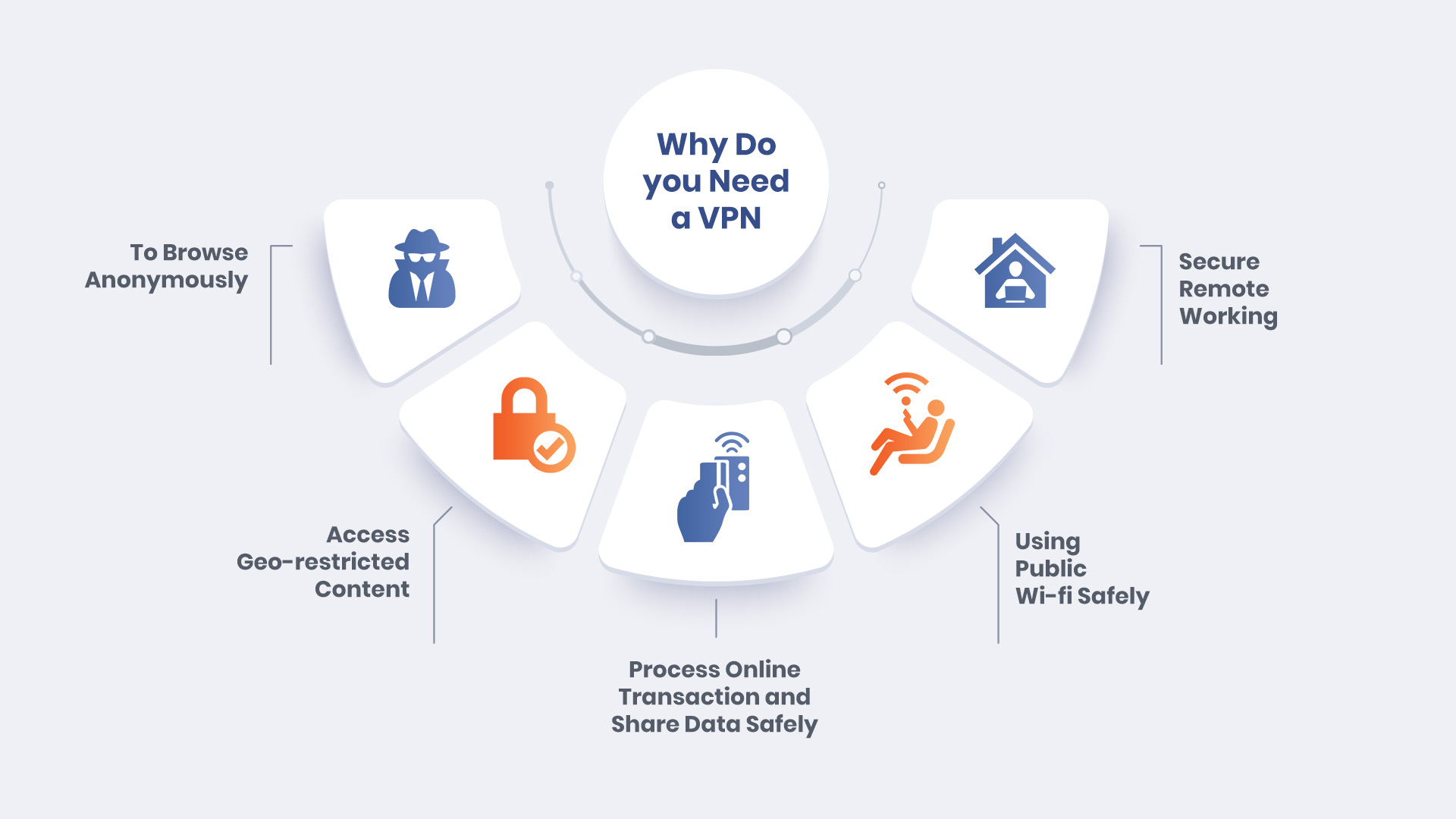
How Free VPNs Differ from Paid VPNs
The choice between free and paid VPNs can significantly impact your online experience. Here’s a comparative analysis:
- Security and Privacy:
- Free VPNs: Often come with limited security features and may log user data to monetize their services.
- Paid VPNs: Provide robust security measures, including advanced encryption and strict no-logs policies.
- Performance:
- Free VPNs: Typically offer slower speeds and limited bandwidth due to overcrowded servers.
- Paid VPNs: Ensure faster connections, unlimited bandwidth, and access to a wide range of servers.
- Features:
- Free VPNs: Basic features with limited server options and support.
- Paid VPNs: Advanced features like kill switches, DNS leak protection, and multi-device support.
| Feature | Free VPNs | Paid VPNs |
|---|---|---|
| Security | Basic encryption, potential data logging | Advanced encryption, strict no-logs |
| Speed | Slower, limited bandwidth | Faster, unlimited bandwidth |
| Server Access | Limited server locations | Extensive server network |
| Support | Minimal customer support | 24/7 dedicated support |
How to Identify a Secure and Reliable VPN
Ensuring that you choose a secure and reliable VPN involves scrutinizing various aspects:
- Encryption Standards: Look for VPNs that use strong encryption protocols like AES-256.
- No-Logs Policy: Verify that the VPN provider maintains a strict no-logs policy, ensuring your data isn’t stored or monitored.
- Server Network: A wide and diverse server network enhances performance and provides more location options.
- Customer Support: Reliable customer service, preferably 24/7 and via multiple channels (e.g., live chat, email), is essential for resolving issues promptly.
- Reputation and Reviews: Research user reviews and independent audits to gauge the VPN’s reliability and trustworthiness.
| Criterion | Importance |
|---|---|
| Encryption Standards | Ensures data is securely transmitted |
| No-Logs Policy | Guarantees privacy by not storing user data |
| Server Network | Improves speed and provides diverse access locations |
| Customer Support | Facilitates quick resolution of technical issues |
| Reputation | Reflects trustworthiness and reliability based on user feedback |
How Different VPN Protocols Affect Performance
VPN protocols dictate the balance between speed and security. Here’s an overview of popular protocols and their impact:
- OpenVPN:
- Security: Highly secure with robust encryption.
- Speed: Moderate, suitable for most online activities.
- Compatibility: Compatible with numerous devices and platforms.
- WireGuard:
- Security: Uses modern encryption techniques, offering strong security.
- Speed: Faster than OpenVPN due to its streamlined code.
- Efficiency: Efficient in handling multiple connections with minimal overhead.
- IKEv2/IPsec:
- Security: Reliable security with strong encryption.
- Speed: Fast, especially on mobile devices with changing networks.
- Stability: Excellent for maintaining connections during network switches.
| Protocol | Security | Speed | Best Use Case |
|---|---|---|---|
| OpenVPN | High | Moderate | General use with a balance of speed and security |
| WireGuard | High | High | Fast connections, gaming, streaming |
| IKEv2/IPsec | High | High | Mobile devices, stable connections |
Why Some Countries Restrict VPN Usage
While VPNs offer substantial benefits, their usage is restricted in certain regions. Understanding the reasons behind these restrictions can help users navigate the global internet landscape effectively.
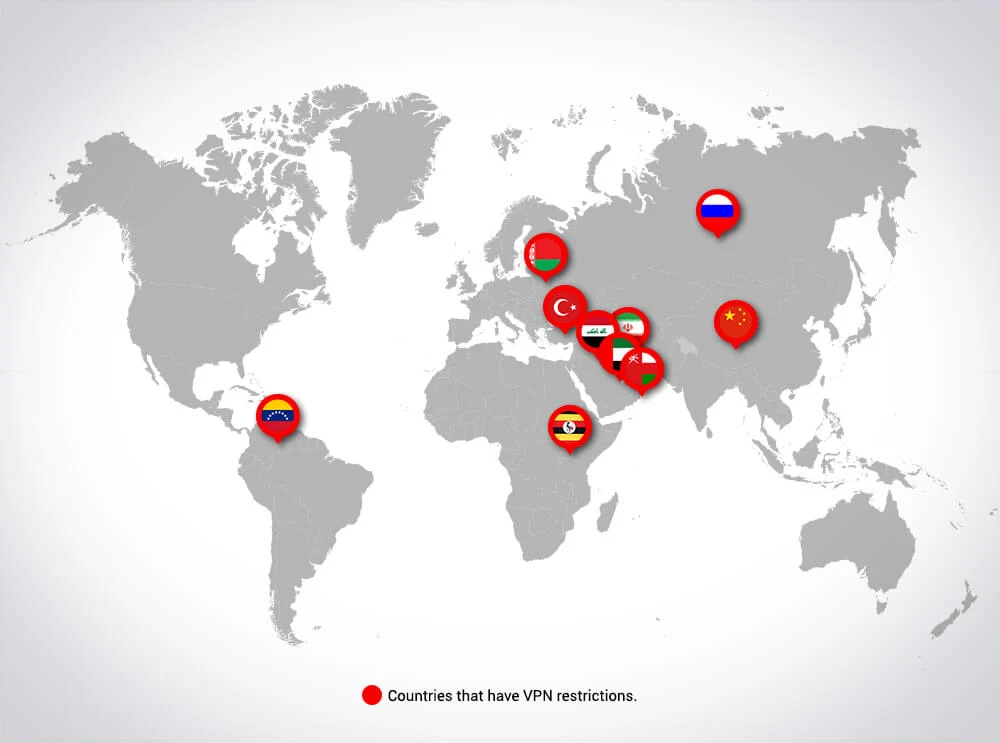
Why Governments Block VPNs in Certain Regions
Governmental restrictions on VPN usage are motivated by several factors aimed at controlling digital information flow and maintaining power structures:
- Information Control:
- Governments seek to manage the dissemination of information to prevent dissent and maintain political stability.
- Example: Countries like China and Russia implement strict VPN bans to control access to foreign media and suppress opposition.
- National Security:
- Authorities often view VPNs as potential tools for hiding illicit activities, including cybercrime and terrorism.
- By blocking VPNs, governments aim to monitor and regulate online interactions more effectively.
- Economic Protectionism:
- Restricting VPN usage can protect local businesses from international competition by limiting access to global markets.
- Countries like the United Arab Emirates and Oman use VPN restrictions to favor domestically provided digital services.
- Cultural and Social Norms:
- VPN bans are sometimes enforced to uphold societal values and prevent exposure to content deemed inappropriate or offensive.
- Example: Iran enforces strict internet controls to align online content with cultural and religious standards.
| Motivation | Description |
|---|---|
| Information Control | Limits access to foreign media and suppresses dissenting views |
| National Security | Aims to prevent the use of VPNs for criminal activities and monitor online interactions |
| Economic Protectionism | Protects local businesses by restricting access to international competitors |
| Cultural Norms | Ensures online content aligns with societal values and religious beliefs |
Why Some Streaming Services Ban VPN Users
Streaming platforms implement VPN bans to comply with licensing agreements and protect their content. Here’s why:
- Licensing Restrictions:
- Content rights are often region-specific, and VPNs can bypass these geographical constraints.
- Platforms like Netflix and BBC iPlayer detect and block VPN traffic to enforce their distribution rights.
- Copyright Protection:
- Ensuring that content is accessible only within licensed regions prevents unauthorized access and distribution.
- VPN usage can lead to copyright infringement by accessing content not intended for certain regions.
- Content Control:
- By banning VPN users, streaming services maintain control over their content libraries, ensuring content is distributed as per contractual agreements.
- Revenue Protection:
- Enforcing geo-restrictions ensures that content is monetized appropriately in different regions, preventing revenue loss from unauthorized access.
- Compliance with Regulations:
- Adherence to regional laws and regulations regarding content distribution is crucial for streaming platforms to operate legally.
| Reason | Impact |
|---|---|
| Licensing Restrictions | Enforces geographical content availability |
| Copyright Protection | Prevents unauthorized access and distribution of region-locked content |
| Revenue Protection | Ensures content is monetized correctly in different regions |
Why Businesses May Limit VPN Access for Employees
While VPNs offer security benefits, businesses sometimes restrict their usage. Here’s why:
- Security Risks:
- VPNs can provide access to unsecured or potentially harmful websites, increasing the risk of malware and data breaches.
- Unrestricted VPN usage may lead to vulnerabilities within the corporate network.
- Data Leak Prevention:
- Limiting VPN access helps prevent unauthorized data transfers, safeguarding sensitive company information from being leaked or stolen.
- Compliance and Policy Enforcement:
- Companies may have strict policies regarding internet usage to comply with industry regulations and protect proprietary information.
- Restricting VPN access ensures adherence to these policies, maintaining organizational security standards.
- Controlled Network Access:
- By managing VPN usage, businesses can ensure that only authorized activities are conducted within the corporate network, reducing the risk of insider threats.
- Resource Management:
- Limiting VPN access helps in managing network resources efficiently, preventing server overloads and ensuring optimal performance for essential tasks.
| Business Reason | Description |
|---|---|
| Security Risks | Prevents access to unsecured websites and reduces vulnerability to malware |
| Data Leak Prevention | Ensures sensitive company information remains protected |
| Compliance | Maintains adherence to industry regulations and internal policies |
How to Set Up and Use a VPN
Setting up a VPN is straightforward, allowing users to enhance their online privacy and security with minimal effort.
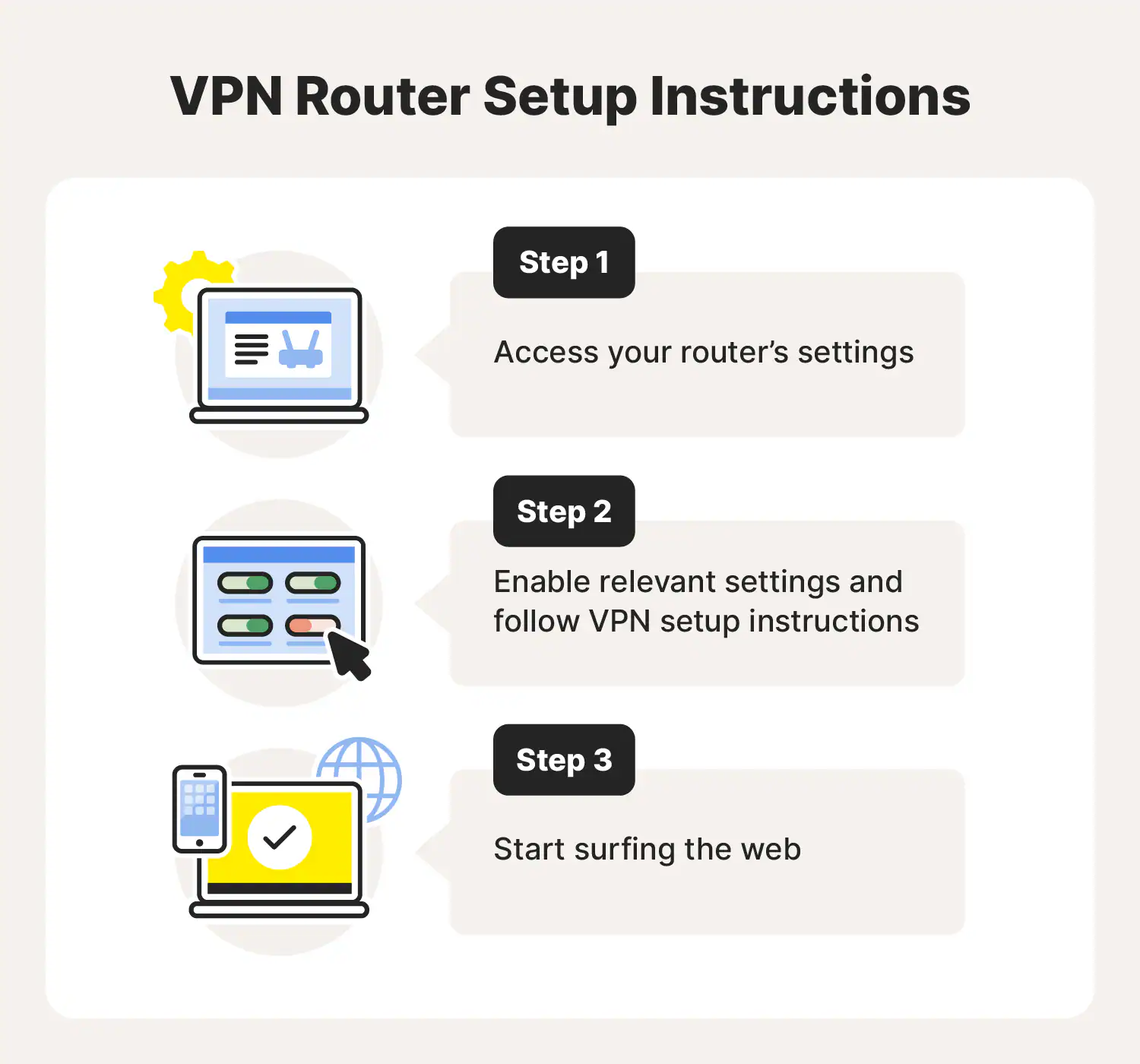
How to Install a VPN on Your Device
Installing a VPN on your device involves a series of simple steps. Here’s a comprehensive guide:
- Choose a VPN Provider:
- Select a reputable VPN service that aligns with your needs, considering factors like privacy policies, speed, and server locations.
- Notable providers include NordVPN, ExpressVPN, and Norton VPN.
- Download the VPN Application:
- Visit the official website or app store (Google Play Store for Android, App Store for iOS) to download the VPN application compatible with your device.
- Install the Application:
- Follow on-screen instructions to install the VPN app. For example, on Windows, run the installer; on macOS, drag the app to your Applications folder.
- Create an Account:
- Launch the application and sign in using your account details, which you created during the VPN subscription purchase.
- Configure VPN Settings:
- Adjust settings like choosing a VPN protocol (e.g., OpenVPN, IKEv2) that best balances security and speed based on your needs. Most apps offer default settings suitable for general use.
- Connect to the VPN:
- Select a server location from the app’s server list and click the connect button to establish a secure connection. The app typically indicates when the connection is successful.
- Verify the Connection:
- Once connected, check your IP address using online tools to ensure it reflects the VPN server’s location, confirming the successful setup.
| Step | Description |
|---|---|
| Choose Provider | Select a VPN service based on features, reputation, and pricing |
| Download Application | Obtain the VPN app from the official website or app store |
| Install Application | Follow installation prompts specific to your device’s operating system |
| Create Account | Sign in with your credentials to access the VPN service |
| Configure Settings | Customize VPN protocols and preferences for optimal performance |
| Connect | Select a server location and establish a secure VPN connection |
| Verify Connection | Ensure your IP address matches the VPN server’s location |
How to Optimize VPN Settings for Speed and Security
Maximizing your VPN’s performance involves fine-tuning its settings to achieve the best balance between speed and security. Here’s how:
- Select the Right VPN Protocol:
- Choose a protocol that meets your needs. For instance, WireGuard offers high speed and strong security, making it ideal for streaming and gaming.
- OpenVPN is a solid choice for general use, providing a reliable balance between speed and encryption strength.
- Choose the Closest Server:
- Connecting to a server geographically closer to your location can reduce latency and improve connection speeds.
- Use the ping test feature in your VPN client to identify the fastest server available.
- Enable Split Tunneling:
- Split tunneling allows you to route specific apps or services through the VPN while others use your regular internet connection, optimizing bandwidth usage.
- Limit Background Applications:
- Closing unnecessary applications can free up bandwidth, enhancing VPN performance during activities like streaming or gaming.
- Optimize Device Performance:
- Ensure your device’s operating system and drivers are up to date. Regular updates can improve overall performance and reduce compatibility issues with the VPN software.
- Restart Network Devices:
- Periodically restarting your router and modem can refresh your internet connection, potentially improving VPN speeds.
| Optimization Tip | Benefit |
|---|---|
| Protocol Selection | Balances speed and security based on user needs |
| Close Proximity Servers | Reduces latency and increases connection speed |
| Enable Split Tunneling | Optimizes bandwidth by routing only necessary traffic |
| Limit Background Apps | Frees up bandwidth, enhancing VPN performance |
| Device Optimization | Ensures compatibility and smooth VPN operation |
How to Troubleshoot Common VPN Issues
Encountering issues while using a VPN is common, but most problems can be resolved with a few troubleshooting steps:
- Check Your Internet Connection:
- Ensure your internet is working correctly by performing a speed test without the VPN to identify any underlying issues.
- Switch Servers:
- If experiencing slow speeds or connection drops, try connecting to a different server. Overloaded servers can degrade performance.
- Adjust Firewall Settings:
- Firewalls or antivirus software may block VPN connections. Temporarily disable these defenses to see if they are the cause of the problem.
- Update the VPN Application:
- Ensure you have the latest version of the VPN app, as updates often include bug fixes and performance improvements.
- Reinstall the VPN Application:
- Uninstall and reinstall the VPN app to resolve any corrupted files or configuration issues.
- Contact Customer Support:
- If issues persist, reach out to your VPN provider’s customer support for personalized assistance and specific troubleshooting steps.
| Troubleshooting Step | Solution |
|---|---|
| Check Internet Connection | Verify stability and speed without VPN |
| Switch Servers | Connect to a less crowded or different location server |
| Adjust Firewall Settings | Temporarily disable firewalls or antivirus software |
| Update Application | Ensure VPN app is up to date with the latest version |
| Reinstall Application | Refresh VPN setup by reinstalling the software |
| Contact Support | Seek professional assistance from VPN provider’s support team |
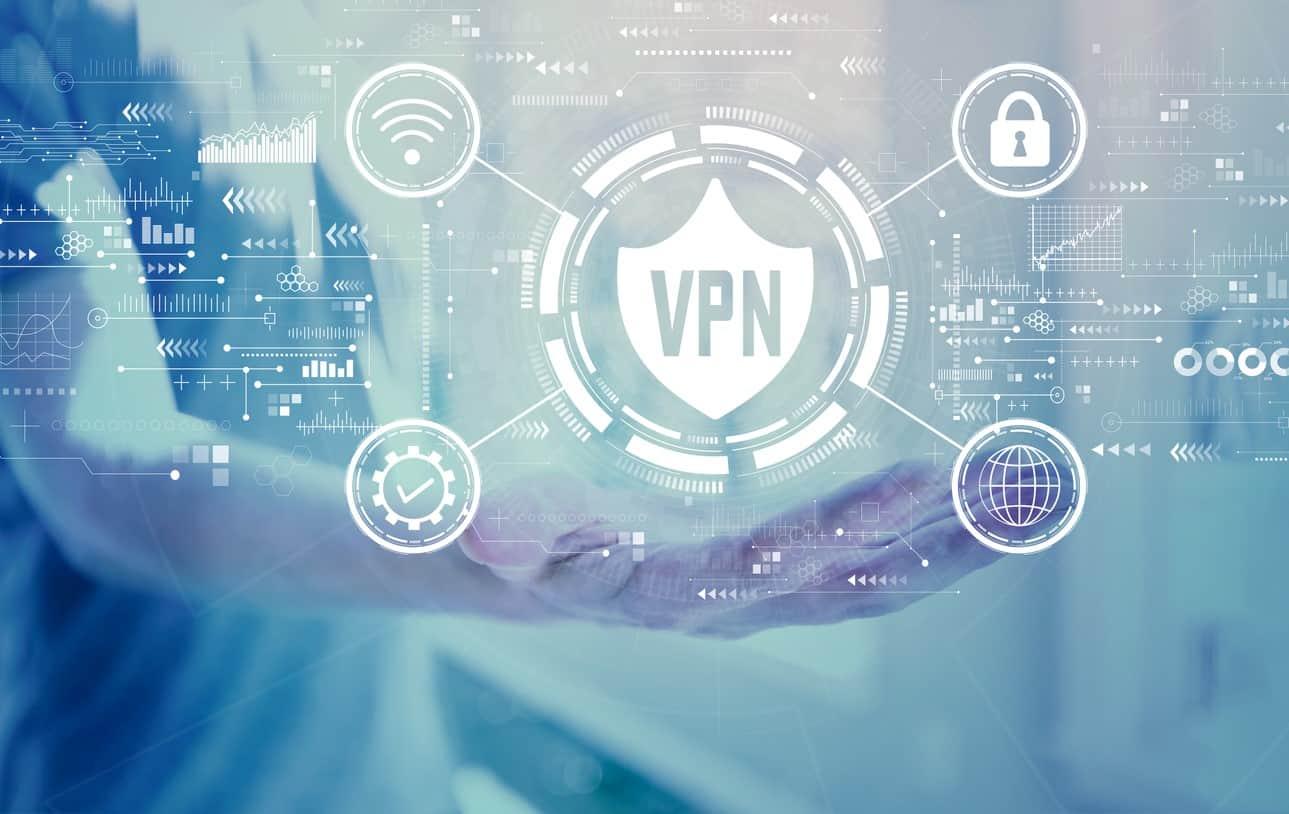
FAQs
1. What is the primary function of a VPN?
A VPN primarily encrypts your internet connection, masks your IP address, and provides secure access to online resources, enhancing your privacy and security.
2. Can a VPN slow down my internet speed?
While VPNs can potentially slow down your internet speed due to encryption, choosing a high-quality VPN and connecting to nearby servers can minimize this effect.
3. Are VPNs legal to use?
In most countries, using a VPN is legal. However, some regions have restrictions or outright bans on VPN usage, so it’s essential to understand local laws before using one.
4. Do free VPNs offer the same level of security as paid ones?
Free VPNs often come with limitations in security features, speed, and server options. Paid VPNs generally provide more robust security, faster speeds, and better customer support.
5. Can a VPN help me access blocked websites?
Yes, a VPN can help bypass geo-restrictions and access blocked websites by routing your connection through a server in a different location.
Key Takeaways
Enhanced Privacy: VPNs encrypt your data, ensuring that your online activities remain private from ISPs, advertisers, and hackers.
Secure Public Wi-Fi Usage: Protects your sensitive information when connected to unsecured public Wi-Fi networks.
Bypass Geo-Restrictions: Allows access to content and services that may be restricted based on your geographical location.
Improved Security: Shields your data from potential cyber threats, maintaining the integrity and confidentiality of your information.
Choice of Protocols: Different VPN protocols offer varied balances of speed and security, catering to diverse user needs.
Legal Considerations: VPN usage legality varies by country, with some regions imposing strict restrictions or bans.
Selecting the Right VPN: Factors like encryption standards, server networks, and privacy policies are crucial in choosing a reliable VPN service.
Free vs. Paid VPNs: Paid VPNs typically offer better security, speed, and customer support compared to free alternatives.
Conclusion
VPNs have entrenched themselves as essential tools in today’s digital ecosystem, offering unparalleled privacy, security, and freedom. By encrypting your internet traffic, masking your IP address, and providing access to geo-restricted content, VPNs empower users to navigate the online world safely and anonymously. As cyber threats and surveillance become more sophisticated, the role of VPNs in safeguarding personal and professional data cannot be overstated.
Choosing the right VPN involves careful consideration of factors like security protocols, server networks, and privacy policies. While free VPNs may appeal to casual users, paid services typically deliver superior performance and comprehensive protection. Additionally, understanding the geopolitical landscape regarding VPN usage can help users make informed decisions about their digital privacy strategies.
In an era where information is both a powerful asset and a potential vulnerability, VPNs provide a crucial line of defense, ensuring that your online presence remains secure and your data stays private. Embracing this technology not only enhances your internet experience but also fosters a safer and more open digital environment for everyone.

